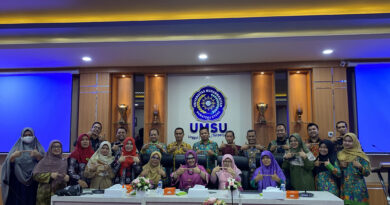The Four Basic Values of Religion
اَلْـحَمْدُ لِلّهِ الَّذِيْ نَـحْمَدُهُ وَنَسْتَعِيْنُهُ وَنَسْتَغْفِرُهُ، وَنَعُوذُ بِاللهِ مِنْ شُرُورِ أَنْفُسِنَا وَمِنْ سَيِّئَاتِ أَعْمَالِنَا، مَنْ يَهْدِهِ اللهُ فَلَا مُضِلَّ لَهُ، وَمَنْ يُضْلِلْ فَلَا هَادِيَ لَهُ، أَشْهَدُ أَنْ لاَّ إِلَهَ إِلاَّ الله وَحْدَهُ لَا شَرِيْكَ لَهُ وَأَشْهَدُ أَنَّ مُـحَمَّداً عَبْدُهُ وَرَسُولُهُ لاَنَبِيَّ بَعْدَهُ. وَالصَّلاَةُ وَالسَّلاَمُ عَلَى رَسُوْلِ اللهِ نَبِيِّنَا مُحَمَّد وَعَلَى اَلِهَ وَ اَصْحَبِهَ وَمَنْ وَّالَاهُ اَمَّا بّعْدُ فَيَاعِبَدَاللهِ أُوْصِيْكُمْ وَأِيَّايَ بِتَقْوَى االلهِ حَقَّ تُقَاتِهِ فَقَدْ فَازَالْمُتَّقُوْنَ
Ma’asyiral Muslimin Rahimakumullah
All praise belongs to Allah, Lord of the worlds. We as servants of Allah must always increase our faith and hope for forgiveness from Allah. Hopefully all the deeds of worship that we do can be accepted by the Most Gracious and Most Merciful. Shalawat and greetings may be poured out on the Prophet Muhammad SAW, an example of Muslims who always upholds humanity, whose mannerisms can be used as a moral compass for life, whose attitude of kindness, trust, tabligh and fathanah can become a wellspring of example that enlightens the universe.
Ma’asyiral Muslimin Rahimakumullah
These days religious life exists without spirituality. Because our religious life only consists of repetition without deep appreciation of Islamic teachings, so it does not touch the depths of the human heart. Sometimes the prayers that we perform seem to be limited to those that are related to the laws regarding their conditions, harmony, validity and invalidity. We are no more like machines that are programmed to perform prayers without feeling the after effects.
Therefore, in practicing religion, it should not be based on a narrow construction of thought and normative corridors that are completely restrictive. Instead, it must be filled with universal religious values and respond to the latest challenges. There are four most essential values in religion.
First, al-Tawhid (monotheism). The basic value of monotheism teaches us that the only Absolute Being is Allah, He is the only entity that has no beginning and no end (qadim and baqa). Meanwhile, humans and all their creatures are a reality whose life span is no more than two atoms in time because their existence is always destroyed (mortal). What is mortal is the universe, Allah is eternal.
The monotheism value is also the basis for all concepts and activities of Muslims, be it economic, political, social or cultural. The essence of monotheism is complete surrender to Divine will, both regarding worship and muamalah, in order to create a pattern of life that is in accordance with Allah’s will. So prayer, life, death, all of that we orient only to Allah and because of Allah. As the Word of Allah SWT:
قُلْ اِنَّ صَلَاتِيْ وَنُسُكِيْ وَمَحْيَايَ وَمَمَاتِيْ لِلّٰهِ رَبِّ الْعٰلَمِيْنَۙ
Say (Muhammad), “Indeed my prayers, my worship, my life and my death are only for Allah, the Lord of all the worlds (QS. Al-An’am: 162)
Tawhid is not intended as a religious doctrine in the sense of belief, obligation or prohibition. But it forms a prism of outlook on life that derives ideas ranging from ethics, morals, education and politics.
Ma’asyiral Muslimin Rahimakumullah
The second, al-Ittiba’ (to follow). This basic religious value suggests the importance of every Muslim always complying with all the prohibitions and orders of Allah SWT as well as emulating and following the Prophet Muhammad. In the Koran there are many verses that instruct Muslims to visit the Prophet SAW so that his life will be safe in this world and the afterlife. Allah SWT says:
يٰٓاَيُّهَا الَّذِيْنَ اٰمَنُوْٓا اَطِيْعُوا اللّٰهَ وَاَطِيْعُوا الرَّسُوْلَ وَاُولِى الْاَمْرِ مِنْكُمْۚ فَاِنْ تَنَازَعْتُمْ فِيْ شَيْءٍ فَرُدُّوْهُ اِلَى اللّٰهِ وَالرَّسُوْلِ اِنْ كُنْتُمْ تُؤْمِنُوْنَ بِاللّٰهِ وَالْيَوْمِ الْاٰخِرِۗ ذٰلِكَ خَيْرٌ وَّاَحْسَنُ تَأْوِيْلًا
O you who believe! Obey Allah and obey the Messenger (Muhammad), and the Ulil Amri (those in authority) among you. Then, if you differ in opinion about something, then return it to Allah (the Qur’an) and the Messenger (sunnah), if you believe in Allah and the Last Day. That is more important (for you) and the consequences are better (An-Nisa’ Verse 59).
The third, al-Taysir (ease). This third basic value is one of the important principles in Islam given by Allah so that humans remain enthusiastic and diligent in carrying out religious teachings, especially in difficult situations. In the rules of Islamic jurisprudence it is stated that every difficulty, in essence, demands ease (al-masyaqqah tajlib al-taysir). One example of ease in religion is mentioned in the QS. Al-Baqarah: 185, which reads:
شَهْرُ رَمَضَانَ الَّذِيْٓ اُنْزِلَ فِيْهِ الْقُرْاٰنُ هُدًى لِّلنَّاسِ وَبَيِّنٰتٍ مِّنَ الْهُدٰى وَالْفُرْقَانِۚ فَمَنْ شَهِدَ مِنْكُمُ الشَّهْرَ فَلْيَصُمْهُ ۗ وَمَنْ كَانَ مَرِيْضًا اَوْ عَلٰى سَفَرٍ فَعِدَّةٌ مِّنْ اَيَّامٍ اُخَرَ ۗ يُرِيْدُ اللّٰهُ بِكُمُ الْيُسْرَ وَلَا يُرِيْدُ بِكُمُ الْعُسْرَ ۖ وَلِتُكْمِلُوا الْعِدَّةَ وَلِتُكَبِّرُوا اللّٰهَ عَلٰى مَا هَدٰىكُمْ وَلَعَلَّكُمْ تَشْكُرُوْنَ
The month of Ramadan is (the month) in which the Qur’an was sent down, as a guide for mankind and explanations regarding that guidance and the difference (between right and wrong). Therefore, whoever among you is in that month, then fast. And whoever is sick or on the way (he does not fast), then (must make up for it), as many days as he left, on other days. Allah desires ease for you, and does not desire hardship for you. You should be sufficient in number and glorify Allah for His guidance given to you, so that you will be grateful (QS. Al-Baqarah: 185).
With this convenience principle, not everyone is required to fast. However, in general there are two ways to redeem fasting debts, namely: qadla and fidyah (QS. Al Baqarah: 184). There are various facilities in Islamic teachings to ensure that Muslims can practice their religion without difficulty in the dimensions of space and time, and encourage them to be diligent in practicing their religion, because it can be done easily and without difficulty. It is also not surprising that the class of contemporary great scholar Yusuf Qaradlawi in his book Al-Ijtihad fi al-Syariati al-Islamiyyah emphasized that the principle underlying Islamic law is taysir or convenience.
Ma’asyiral Muslimin Rahimakumullah
Fourth, the value of maslahah. Besides taysir, another main principle in Islam is benefit. The opposite of trouble is harm. This is based on the hadith of the Prophet narrated by Ahmad which states that Laa dlirara wa laa dlirara¸ is not harmful and harmful. Al-Ghazali in the book Mushtasfa min Ilm al-Usul argues that the relationship that is built between shari’a and istislah (benefit) is very close. Maslahat according to al-Ghazali is maintaining religion, soul, mind, lineage, and wealth.
The existence of problems in the principles of Islamic teachings indicates that suffering is something that must be abandoned. Because Islam does not teach spiritual achievement through suffering. God does give suffering in the form of a little fear, hunger, and lack of wealth, but this is to elevate human dignity, as in QS. Al Baqarah verse 155 which reads:
وَلَنَبْلُوَنَّكُمْ بِشَيْءٍ مِّنَ الْخَوْفِ وَالْجُوْعِ وَنَقْصٍ مِّنَ الْاَمْوَالِ وَالْاَنْفُسِ وَالثَّمَرٰتِۗ وَبَشِّرِ الصّٰبِرِيْنَ
And We will certainly test you with some fear, hunger, lack of wealth, souls and fruits. And convey good news to those who are patient (QS. Al Baqarah: 155).
Thus, today’s brief sermon, let us dive deep into the niches of these religious values so that we can always live happily in this world and the hereafter. Hopefully in living our daily lives we are always in the love of Allah swt. Amen.
بَارَكَ اللهُ لِيْ وَلَكُمْ فِي الْقُرْآنِ الْعَظِيْمِ، وَنَفَعَنِيْ وَإِيَّاكُمْ بِمَا فِيْهِ مِنَ اْلآيَاتِ وَالذِّكْرِ الْحَكِيْمِ. أَقُوْلُ قَوْلِيْ هَذَا وَأَسْتَغْفِرُ اللهَ الْعَظِيْمَ لِيْ وَلَكُمْ وَلِسَائِرِ الْمُسْلِمِيْنَ مِنْ كُلِّ ذَنْبٍ. فَاسْتَغْفِرُوْهُ، إِنَّهُ هُوَ الْغَفُوْرُ الرَّحِيْمُ.
Second Sermon
الْحَمْدُ للهِ الَّذِيْ هَدَانَا لِهذَا وَمَا كُنَّا لِنَهْتَدِيَ لَوْلَا أَنْ هَدَانَا اللهُ، أَشْهَدُ أَنْ لَا إِلهَ إِلَّا اللهُ الْمَلِكُ الْحَقُّ الْمُبِيْنُ وَأَشْهَدُ أَنَّ مُحَمَّدًا عَبْدُهُ صَادِقُ الْوَعْدِ الْأَمِيْنُ، اللّهُمَّ فَصَلِّ عَلَى مُحَمَّدٍ وَآلِهِ وَأَصْحَابِهِ وَمَنْ تَبِعَهُ إِلَى يَوْمِ الدِّيْنِ، أَمَّا بَعْدُ، فَأُوْصِيْنِي وَإِيَّاكُمْ بِتَقْوَى اللهِ حَقَّ تُقَاتِهِ لَعَلَّكُمْ تُرْحَمُوْنَ،
May we all be able to make ourselves as pious servants, practice the behavior of pious people and one day be called to face Allah with piety attached to our hearts. Amen.
إِنَّ اللهَ وَمَلاَئِكَتَهُ يُصَلُّوْنَ عَلَى النَّبِيِّ، يَاأَيُّهاَ الَّذِيْنَ ءَامَنُوْا صَلُّوْا عَلَيْهِ وَسَلِّمُوْا تَسْلِيْمًا. اَللَّهُمَّ صَلِّ وَسَلِّمْ وَبَارِكْ عَلَى مُحَمَّدٍ وَعَلَى آلِهِ وَأَصْحَابِهِ وَقَرَابَتِهِ وَأَزْوَاجِهِ وَذُرِّيَّاتِهِ أَجْمَعِيْنَ. اَللَّهُمَّ اغْفِرْ لِلْمُسْلِمِيْنَ وَالْمُسْلِمَاتِ وَالْمُؤْمِنِيْنَ وَالْمُؤْمِنَاتِ اْلأَحْيَاءِ مِنْهُمْ وَاْلأَمْوَاتِ، إِنَّكَ قَرِيْبٌ مُجِيْبُ الدَّعَوَاتِ وَيَا قَاضِيَ الْحَاجَاتِ.
عِبَادَ اللهِ، إِنَّ اللهَ يَأْمُرُكُمْ بِالْعَدْلِ وَاْلإِحْسَانِ وَإِيتَآئِ ذِي الْقُرْبَى وَيَنْهَى عَنِ الْفَحْشَآءِ وَالْمُنكَرِ وَالْبَغْيِ يَعِظُكُمْ لَعَلَّكُمْ تَذَكَّرُوْنَ. فَاذْكُرُوا اللهَ الْعَظِيْمَ يَذْكُرْكُمْ وَادْعُوْهُ يَسْتَجِبْ لَكُمْ وَلَذِكْرُ اللهِ أَكْبَرُ
Editor: Fauzan AS
Penulis: Ilham Ibrahim




